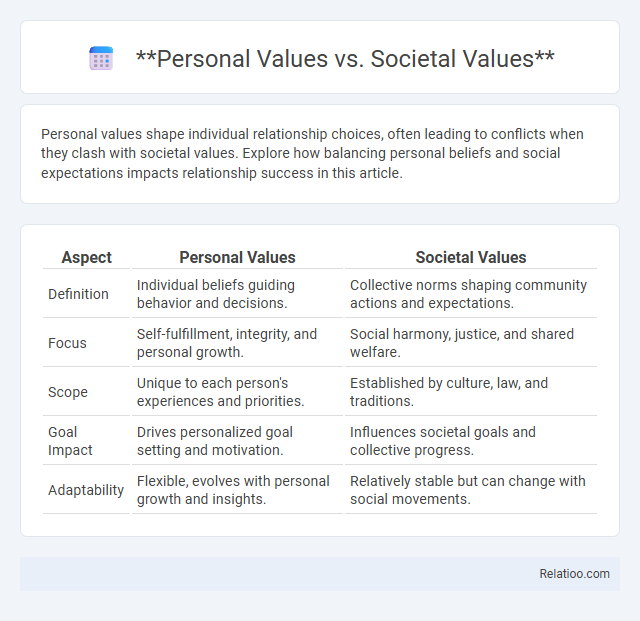Personal values shape individual relationship choices, often leading to conflicts when they clash with societal values. Explore how balancing personal beliefs and social expectations impacts relationship success in this article.
Table of Comparison
| Aspect | Personal Values | Societal Values |
|---|---|---|
| Definition | Individual beliefs guiding behavior and decisions. | Collective norms shaping community actions and expectations. |
| Focus | Self-fulfillment, integrity, and personal growth. | Social harmony, justice, and shared welfare. |
| Scope | Unique to each person's experiences and priorities. | Established by culture, law, and traditions. |
| Goal Impact | Drives personalized goal setting and motivation. | Influences societal goals and collective progress. |
| Adaptability | Flexible, evolves with personal growth and insights. | Relatively stable but can change with social movements. |
Understanding Personal Values
Understanding personal values involves recognizing deeply held beliefs that guide individual behavior and decision-making, distinct from societal values which represent collective norms shared by a community. Value clarification is a process that helps individuals identify and prioritize these personal values, enhancing self-awareness and aligning actions with core principles. This differentiation empowers individuals to navigate conflicts between personal convictions and societal expectations effectively.
Defining Societal Values
Societal values are the shared principles and norms that guide behavior within a community or culture, reflecting collective beliefs about what is important for social cohesion and well-being. These values often influence laws, customs, and public policies, shaping societal expectations and moral frameworks. Understanding societal values is essential for navigating social interactions and resolving conflicts between individual desires and communal responsibilities.
Origins of Personal and Societal Values
Personal values originate from individual experiences, upbringing, and cultural background, shaping your unique moral framework and guiding personal decisions. Societal values emerge from collective norms, traditions, and shared beliefs that maintain social order and community cohesion. Value clarification bridges these by helping you identify and prioritize your own values while understanding how they align or differ from broader societal expectations.
How Personal Values Shape Individual Behavior
Personal values deeply influence your decisions and actions, serving as internal compasses that guide behavior and priorities. Unlike societal values, which represent collective norms and expectations, personal values are unique and shaped by individual experiences, beliefs, and emotions. Value clarification helps you identify and understand these personal priorities, enabling consistent behavior aligned with your true self.
The Role of Societal Values in Community Cohesion
Societal values serve as the foundational norms that promote community cohesion by fostering shared beliefs and collective behaviors among members. These values support social order and mutual respect, enabling your interactions within the community to be harmonious and cooperative. Understanding how personal values align or diverge from societal values through value clarification helps individuals navigate their roles and responsibilities effectively.
Conflicts Between Personal and Societal Values
Conflicts between personal and societal values often arise when individual beliefs and priorities clash with collective norms and expectations, creating tension in ethical decision-making and social interactions. Personal values, shaped by upbringing and experiences, may emphasize autonomy and self-expression, while societal values prioritize cohesion, tradition, or conformity. Value clarification techniques help individuals recognize, evaluate, and reconcile these differences, fostering greater self-awareness and more informed choices amid conflicting demands.
Navigating Value Clashes in Everyday Life
Personal values often reflect individual beliefs and priorities, while societal values represent collective norms influencing community behavior. Navigating value clashes involves recognizing these differences, engaging in respectful dialogue, and applying value clarification techniques to identify fundamental principles that guide decision-making. Effective resolution requires balancing personal integrity with social harmony to foster understanding and cooperation in diverse environments.
The Impact of Culture on Values
Culture profoundly shapes both personal values and societal values, influencing your beliefs, behaviors, and decision-making processes. Personal values reflect individual priorities shaped by cultural background, while societal values represent collective norms shared within a community or nation. Value clarification helps you discern and align your own values amidst diverse cultural influences, enhancing self-awareness and intercultural understanding.
Aligning Personal Values with Societal Expectations
Aligning personal values with societal expectations involves understanding and integrating core individual beliefs with communal norms to foster social harmony and personal authenticity. Value clarification techniques facilitate this alignment by helping individuals identify, reflect on, and prioritize their values in relation to societal demands and ethical standards. Emphasizing this congruence promotes responsible decision-making and enhances interpersonal relationships within diverse cultural contexts.
Building a Harmonious Balance: Personal and Societal Values
Balancing personal values with societal values requires a clear process of value clarification to identify what matters most to you while respecting the collective norms. Understanding these values helps in navigating conflicts and fostering mutual respect, which is essential for social harmony. Cultivating this awareness promotes a harmonious balance where individual integrity aligns with community well-being, enhancing cooperation and social cohesion.

Infographic: Personal Values vs Societal Values
 relatioo.com
relatioo.com